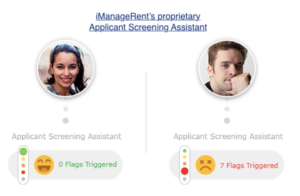The most important decision you will make!
Selecting tenants for a rental property is often a make-or-break decision for most landlords, property managers and owners. A qualified tenant can give you peace of mind and reliability while an un-qualified tenant can irreparably damage your business and eliminate profits. Being forced to evict a bad tenant can be costly and time consuming and collecting back rent owed after an eviction can often prove impossible. Even beyond that, tenants who damage or destroy property can create costly repairs, code violations and cascading maintenance issues that can take your business years to recover from.
In general, the purpose of tenant screening is not to determine your eligibility for a certain program, but to determine if you are likely to be a good tenant. A good tenant is one who:
- Pays the rent on time.
- Complies with the lease.
- Keeps an apartment in good condition.
- Does not disturb neighbors or damage property.
- Does not engage in criminal activity, including using illegal drugs.
- Provides information reasonably necessary to evaluate an application.
- Does not commit fraud in their application process.
The availability of online tenant screening options has become a powerful tool in the real-estate business that when property utilized can mitigate the risk of selecting a risky tenant but is by no means fool proof. In this blog we will cover how online screening can help guide you to the right tenants as well as a few tips that go beyond the digital world into the physical when you are face to face with a potential renter.
First and foremost it is important to check with your local and state laws as well as the Fair Housing Act before you begin advertising a rental unit, accepting applications, charging application fees or running background screenings. Every state has its own unique laws and often towns and cities will have their own local ordinances and laws that dictate things like questions you can ask, reports you can pull, requirements you can set and how much you can charge for an application fee. These laws change often so it is a best practice to keep up to date on your local requirements to maintain compliance.
Online Screening:
1: Credit Check – Pulling a credit report on a prospective
tenant is the number one indicator of their history of reliable payments. Past behavior often dictates future behavior and if a potential renter has a proven history of making payments on time, they are a less risky choice as a tenant. Ideally you want an applicant to have a high credit score with no history of bankruptcy, tax liens or a large debt to income ratio.
2: Eviction History – An eviction history report is another good indicator of a prospects past behavior patters as a renter. If a prospect has no past history of eviction, or at least no recent history of eviction, it is a good indicator that they will be a reliable tenant.
3: Former Landlord and Personal References – Requiring an applicant to provide a number of references can be crucial in determining their past rental behavior and personal temperament. An applicant with a number of positive current and former landlord references is especially important when screening potential tenants.
4: Criminal Record – A criminal conviction record is yet another good indicator of a prospects past behavior pattern. If a prospect has no past history of a criminal conviction involving violence, property damage or fraud it is a good indicator that they will be a safe and reliable tenant. Landlords cannot however have a blanket policy to deny all applicants with any criminal conviction history as per the Fair Housing Act.
5: Income Requirements – For applicants who are not part of social programs for housing assistance income requirements are a vital step in the screening process. Ideally you want a prospects monthly income to be 2.5 – 4 times the amount of rent (plus utilities when applicable). This requirement is simple math, if the monthly rent is $1,500 and the applicant only makes $1,700 a month their ability to afford the apartment is unlikely.
6: Employment Requirements – Looking into an applicants current and recent employment history for those who are not part of social programs for housing assistance is another good indicator of ability to pay rent reliably. If an applicant has a defined steady career and has been employed long term (a year or more) at the same company it is a good sign that they will also be a reliable tenant.
7: Fist Month & Security Deposit Ready – Requiring an applicant that is not part of social programs for housing assistance to have first months’ rent and security deposit in hand and ready without delay is a basic financial qualifier.
Real-World Interactions:
In the real-world applicant screening begins at the initial point of contact and there are a number of ways you can form an impression of a prospect during these early encounters. It is a best practice to financially pre-qualify a prospective tenant before you physically show them your property as well as to consider booking group showings whenever possible to maximize your time and efforts. Keep in mind that when a prospect is interested in renting from you it is a very similar experience to that of a job interview and should be treated as such. While their application may equate to their resume, any realworld interactions and showings are equal to that of an interview process.
1: First Contact – If a prospect has clearly read your entire rental listing including any application guidelines and stipulations it is a good indication that they have a high level of interest as well as attention to detail.
2: Willingness to provide information – If a prospect has no issues adhering to your guidelines for setting up a showing, pre-qualifications or application process it is a good indication that they have nothing to hide and are willing to respect your policies and rules.
3: Being on time – If a prospect is on time (or early) for an in person showing it is an indication that they respect your time and have reliability and organizational tendencies.
4: Professional appearance & demeanor – If a prospective tenant is dressed appropriately, acts professionally and is well spoken during a showing it is an excellent indication of how they will interact with you, other tenants and treat your property.
5: Asking questions – If a prospective tenant shows genuine interest and asks engaging questions about the property, area or company during a showing it is a good sign that they care about their living situation and are interested in a long term fit for their housing needs.
Real-World Red Flags:
In a real-world setting there are many clues that a prospect can display that might give you an indication of whether or not you want them as a tenant. In most cases it is good to trust your gut feeling about the impression a prospect leaves you with after a real-world encounter such as a phone call or in-person showing. If a prospect displays any of the follow red flags or in any other way makes you feel uncertain about their reliability or honesty it is a good indication that they are a risk not worth taking on.
1: Dishonesty – If a prospect is caught in a lie or mis-truth during the screening process it is an automatic deal-breaker. For example, if you witness them arriving to a showing smoking a cigarette and they indicate on their application that they do not smoke, it is a clear red flag. The prospect is effectively telling you that they cannot be trusted.
2: Avoiding the application process – If a prospect is unwilling to adhere to your application process, withholds required information or wants to forgo the process entirely by offering you cash at an inperson showing, it is a clear red flag. Unwillingness to adhere to your defined application procedures or intentionally omitting information often indicates the prospect has something to hide and or does not respect your business structure and rules.
3: Missed showing – If you schedule a showing with a prospect and they no-call no-show and later reach out wanting to re-schedule it should be considered a dealbreaker. Occasionally there are extenuating circumstances that should be considered, but generally speaking if the prospect does not inform you before or during the appointed time of a showing that they are going to be late or miss it entirely, it is a clear red flag. A prospect that does not respect your time and effort during the early stages of your relationship is unlikely to prove to be a reliable long-term tenant.
4: Information discontinuity – If the information that a prospect tells you at an in-person showing does not align with the information provided during the application process, it is a clear red flag. A prospect who tells you one thing in person and another on paper is likely trying to hide something or misrepresent their qualifications.
5: Aggressive negotiation or suspicious behavior – If a prospect tries to aggressively negotiate rent or security deposits as well as move in dates or payment schedules, it is a clear red flag. A prospect who attempts to drastically negotiate a fair rental amount, get you to reduce or waive a security deposit, split up payment schedules (e.g., paying security after move in or as installments) or is otherwise engaging in suspicious tactics is giving you clear reason to disqualify them from consideration as a potential tenant.
Conclusion:
Screening potential tenants is one of the fundamental aspects of being a landlord or property manager. A good tenant can make you and a bad tenant can break you in this business. iManageRent can help make the process easier with our online tenant applications with in-line background and credit screening report options. Our applicant screening assistant will automatically give you an at-a-glance overview of how an applicant’s information and financial details align with your customized rental criteria that you set though your landlord dashboard. This will help you identify those that most closely fit with your rental requirements.
iManageRent provides landlords, property managers and tenants tools to better manage the life cycle of a rental property. From listing vacancies to background checks, online rent payments, late fee accounting, security deposit accounting, document storage, to much, much more… please feel free to join us today!
iManageRent is here to help answer any questions you may have about listing your property and screening tenants. Our knowledgeable, experienced support staff is available 24-7 and can be contacted by phone at (415) 881-3311 or by email at Support@iManageRent.com anytime. If you like to see our product in action please schedule a live one-on-one online demo by clicking here.




